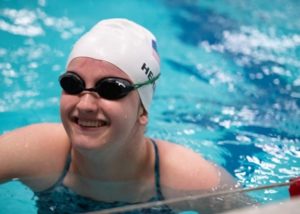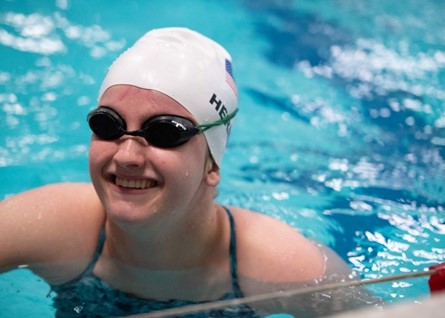
At the January 23, 2020 meeting of the Greater Alexandria Chapter of the National Federation of the Blind, gold metal and record-holding Paralympic swimmer McClain Hermes talked about her challenges and her successes at becoming a world-class athlete — who happens to be blind.
McClain Hermes stood at the front of the packed room while her mother, grandmother, and guide dog, Blake, listened to her story of achievement.
At the age of four, McClain told her family that she wanted to be in the Olympics. Soon after, she began practicing becoming a competitive swimmer. However, McClain’s path to the Olympics took a detour when she began not being able to see clearly. Due to a very rare genetic disease, McClain faced a more personal challenge, that of going blind.
Rather than tossing away her dream of winning gold, McClain began experimenting with ways to continue her Olympic dreams by using the adaptive techniques of blindness in her training program.
Two of the challenges she faced as a blind person was swimming straight so that she stayed in her lane and knowing when she was at the end of the pool so that she could quickly flip in the water and use her legs to propel her in the opposite direction. This was essential if McClain wanted to eventually become a member of Team America.
To stay in her lane while swimming, McClain uses the rope of floats that separate one lane from another and uses her hand and elbow to touch the rope after every few strokes. That way, if she feels that the rope is getting too close or too far away, she can modify her strokes to put herself straight again.
For a blind person, knowing when you are at the end of your lane and in danger of swimming into the wall is very important. Particularly, if you are swimming at Olympic gold speeds.
Initially, McClain and her mother came up with a solution. They attached a tennis ball to the end of a pole. When McClain approached the wall, her mother would tap her on the head with the ball. This signaled McClain that it was time to turn.
This solution required McClain’s mother to stand at the end of the lane for the entire practice session. To relieve her mother of this duty, McClain used a water sprinkler where her mother used to stand. So, when McClain was approaching the wall, she would feel the droplets on her back which would alert her that the wall was coming.
McClain Hermes’ appearance at the Greater Alexandria Chapter of the NFB of Virginia meeting taught many lessons. The most powerful lessons: one’s dreams do not have to be sidelined by blindness and having the support of one’s friends and family can help you reach those dreams.

Photo Courtesy of McClain Hermes

0 Comments